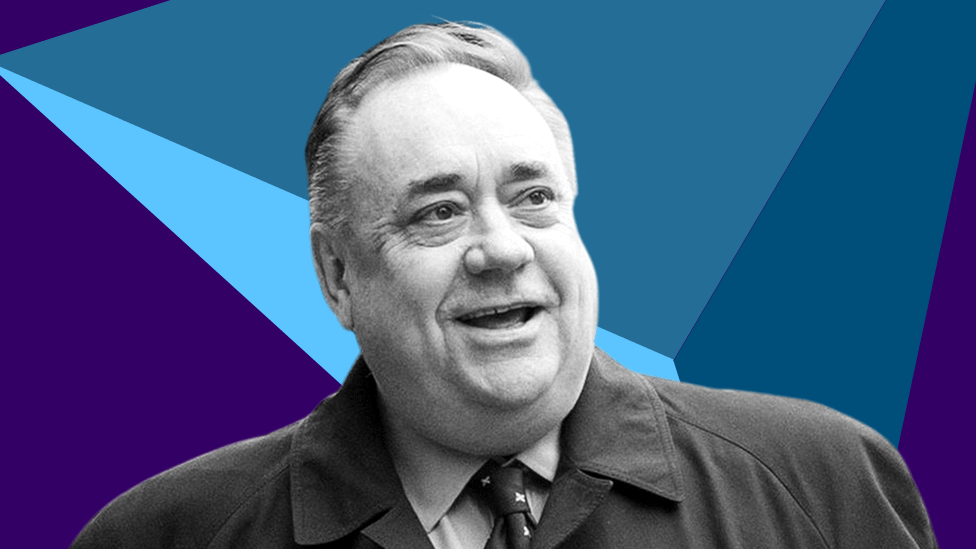Who is Alba leader Alex Salmond?

- Published
Alex Salmond - The basics
Age: 69
Education: Linlithgow Academy, University of St Andrews
Family: Married to Moira. No children.
Parliamentary constituency: None
Who is he?
Alex Salmond was born in Linlithgow on 31 December 1954. Both of his parents worked as civil servants.
After leaving school, he studied at the Edinburgh College of Commerce for a year before going on to study economics and medieval history at St Andrews.
It was while at university that he became involved in SNP politics, joining the Federation of Student Nationalists in 1973.
After graduating in 1978, he initially worked as an assistant economist in the Department of Agriculture and Fisheries for Scotland before joining the Royal Bank of Scotland, where he spent seven years – latterly as an oil economist.
Mr Salmond was a member of the socialist 79 Group within the SNP, which was briefly banned by the party before its members were subsequently reinstated.
What was his route to power?
Mr Salmond was first elected as the MP for Banff and Buchan in the 1987 general election before winning the leadership of the SNP in 1990.
After being re-elected as an MP in 1992 and 1997, he was elected to the newly-created Scottish Parliament in 1999 before standing down as party leader a year later after a series of internal party rows.
He was succeeded as leader by John Swinney, and quit the Scottish Parliament in 2001 in order to lead the SNP group in the House of Commons.
Mr Swinney resigned in 2004 following poor SNP results in that year’s European elections. Mr Salmond won a comfortable victory in the contest to replace him.
Mr Salmond returned to the Scottish Parliament in the 2007 election. The SNP made history by finishing as the largest party, which allowed it to form the Scottish government for the first time with Mr Salmond as first minister.
After winning a majority of the seats in the 2012 Holyrood election Mr Salmond and David Cameron, the UK prime minister, signed a deal to hold an independence referendum two years later.
Mr Salmond immediately quit as both first minister and SNP leader after the Yes campaign lost the referendum. He was replaced by his deputy, Nicola Sturgeon.
He lost his Commons seat to the Conservatives in 2017 and then hosted a talk show on the RT channel. He resigned from the SNP after it emerged that allegations of sexual misconduct while he was first minister had been made against him.
He was cleared of all the charges against him in a criminal trial in March 2020.
He announced a year later that he was joining and would become leader of the Alba Party, a new pro-independence party.

What are his key pledges?
Mr Salmond, who is not standing as a candidate in the general election, has said that a vote for Alba is an "unambiguous" vote for independence.
The party has not yet published its manifesto, but policies include:
Granting new oil and gas licences in the North Sea, with carbon capture being a condition for such licences
Introducing an annual £500 payment to assist half a million low-earnings households in Scotland and increasing the Scottish Child Payment to £40 a week for low-income families
An independent Scotland to apply for immediate entry into the European Free Trade Association with an aim to eventually re-enter the European Union
To protect the rights of women and girls "in the face of moves to enforce gender self-identification which involves a sacrifice of women's protected spaces"
What state are Alba in?
When he launched Alba’s election campaign, Mr Salmond said it was aiming to stand in 20 seats in Scotland and would also be supporting former SNP MP Angus Brendan MacNeil, who is standing as an independent candidate in Na h-Eileanan an lar.
This will be the party’s first general election campaign, but it failed to have any candidates elected in either the 2021 Scottish Parliament election – when it secured 1.7% of the votes - or the council elections the following year.
Despite its lack of electoral success so far, Alba did have two MPs at Westminster in addition to an MSP at Holyrood. All three were elected as SNP parliamentarians before subsequently defecting to Alba.
It would be a major surprise if Alba was to win any seats in this election, with Mr Salmond saying his main target is to secure 15% of the vote and 20 seats at the Holyrood election in 2026.
When asked if Alba would split the pro-independence vote and potentially help Labour win Scottish seats from the SNP in the general election, he said that would not be the case and the party would instead "mobilise" independence voters.